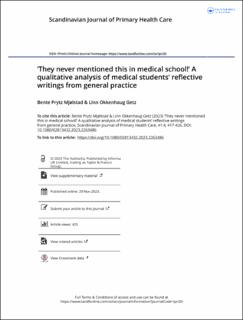| dc.contributor.author | Mjølstad, Bente Prytz | |
| dc.contributor.author | Getz, Linn Okkenhaug | |
| dc.date.accessioned | 2024-03-14T06:55:26Z | |
| dc.date.available | 2024-03-14T06:55:26Z | |
| dc.date.created | 2023-10-31T10:09:12Z | |
| dc.date.issued | 2023 | |
| dc.identifier.citation | Scandinavian Journal of Primary Health Care. 2023, 41 (4), 417-426. | en_US |
| dc.identifier.issn | 0281-3432 | |
| dc.identifier.uri | https://hdl.handle.net/11250/3122259 | |
| dc.description.abstract | Abstract Objective The aim of the study was to identify final-year medical students’ experiences with thought-provoking and challenging situations in general practice. Design setting and subjects We conducted a qualitative analysis of 90 reflective essays written by one cohort of Norwegian final-year medical students during their internship in general practice in 2017. The students were asked to reflect upon a clinical encounter in general practice that had made a strong impression on them. A primary thematic content analysis was performed, followed by a secondary analysis of encounters that stood out as particularly challenging. Main outcome measures Clinical scenarios in general practice that make students feel professionally ‘caught off guard’. Results The analysis identified several themes of challenging student experiences. One of these was ‘disorienting encounters’ for which the students felt totally unprepared in the sense that they did not know how to think and act. Five different scenarios were identified: (1) patients with highly distracting appearances, (2) ‘ordinary consultations’ that suddenly took a dramatic turn, (3) patients who appeared unexpectedly confrontational or devaluating, (4) scornful rejection of the young doctor’s advice, and finally, (5) confusion related to massive contextual complexity. Conclusions Disorienting encounters stood out as particularly challenging clinical experiences for medical students in general practice. These scenarios evoked an acute feeling of incapacitation: not knowing what to think and do. Further curriculum development will focus on preparing the students to ‘know what to do when they don’t know what to do’. KEY POINTS Final-year medical students experience several challenging clinical scenarios in general practice, for which the curriculum has prepared them at least to a certain extent. -However, scenarios occasionally occur, for which students feel totally unprepared. In such ‘disorienting’ encounters they experience moments of not knowing what to do that conflict with their ideas of what it means to be a professional. -The undergraduate curriculum in general practice should aim to prepare students for unexpected, bewildering scenarios to prevent experiences that could alienate the students from general practice as a potential career choice. | en_US |
| dc.language.iso | eng | en_US |
| dc.publisher | Taylor & Francis | en_US |
| dc.rights | Navngivelse 4.0 Internasjonal | * |
| dc.rights.uri | http://creativecommons.org/licenses/by/4.0/deed.no | * |
| dc.title | ‘They never mentioned this in medical school!’ A qualitative analysis of medical students’ reflective writings from general practice | en_US |
| dc.title.alternative | ‘They never mentioned this in medical school!’ A qualitative analysis of medical students’ reflective writings from general practice | en_US |
| dc.type | Peer reviewed | en_US |
| dc.type | Journal article | en_US |
| dc.description.version | publishedVersion | en_US |
| dc.source.pagenumber | 417-426 | en_US |
| dc.source.volume | 41 | en_US |
| dc.source.journal | Scandinavian Journal of Primary Health Care | en_US |
| dc.source.issue | 4 | en_US |
| dc.identifier.doi | 10.1080/02813432.2023.2263486 | |
| dc.identifier.cristin | 2190348 | |
| cristin.ispublished | true | |
| cristin.fulltext | original | |
| cristin.qualitycode | 1 | |

